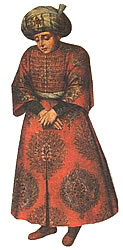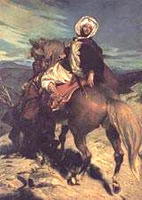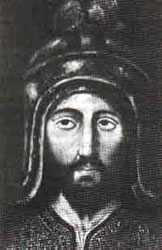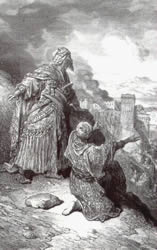BOABDIL Y MORAYMA
 Abu Abdullah / Boabdil el Chico (1460 - 1527) se debe a la pérdida de Granada en favor de los Reyes Católicos, poniendo éstos fin a la Reconquista. Abu Abd Allah era el hijo mayor de Muley Hacén y de la princesa Fátima. Los últimos años del reino nazarí estuvieron cargados de tensión y enfrentamientos continuos entre las diferentes facciones de poder. En esta línea, la propia princesa madre animó a Boabdil a rebelarse contra su padre, afectada por una cuestión de celos ya que Muley Hacén tomaba en mayor consideración a la nueva favorita, la cautiva cristiana Isabel de Solís.
Abu Abdullah / Boabdil el Chico (1460 - 1527) se debe a la pérdida de Granada en favor de los Reyes Católicos, poniendo éstos fin a la Reconquista. Abu Abd Allah era el hijo mayor de Muley Hacén y de la princesa Fátima. Los últimos años del reino nazarí estuvieron cargados de tensión y enfrentamientos continuos entre las diferentes facciones de poder. En esta línea, la propia princesa madre animó a Boabdil a rebelarse contra su padre, afectada por una cuestión de celos ya que Muley Hacén tomaba en mayor consideración a la nueva favorita, la cautiva cristiana Isabel de Solís.
Boabdil fue proclamado rey por los granadinos sublevados contra Muley en el año 1482. Junto al apoyo popular, Boabdil recibía el de los abencerrajes, uno de los más importantes grupos de presión política y económica. El inicio de la Guerra de Granada fue beneficioso para Boabdil ya que consiguió derrotar a los cristianos al este de Málaga pero pronto fue hecho prisionero en Lucena. Muley volvía a ocupar el trono temporalmente hasta que una nueva revuelta colocaba en el poder a al-Zagal, hermano de Muley. Los Reyes Católicos consideraron que Boabdil podría hacer más daño en Granada que cautivo en el castillo de Lucena ya que aumentaría las tensiones en el reino nazarí.
 Boabdil consiguió la libertad después de firmar un tratado de paz. Al-Zagal se negó a reconocer la soberanía de su sobrino y se llegó a una situación de guerra civil que beneficiaba considerablemente a los cristianos. Al-Zagal llegó a un acuerdo con Isabel y Fernando, avanzando éstos sus posiciones y cercando a Boabdil. Tras dos años de continuas luchas y cercada la ciudad de Granada, Boabdil inició conversaciones con Gonzalo Fernández de Córdoba que acabaron con la rendición y la entrega de la ciudad el 2 de enero de 1492.
Boabdil consiguió la libertad después de firmar un tratado de paz. Al-Zagal se negó a reconocer la soberanía de su sobrino y se llegó a una situación de guerra civil que beneficiaba considerablemente a los cristianos. Al-Zagal llegó a un acuerdo con Isabel y Fernando, avanzando éstos sus posiciones y cercando a Boabdil. Tras dos años de continuas luchas y cercada la ciudad de Granada, Boabdil inició conversaciones con Gonzalo Fernández de Córdoba que acabaron con la rendición y la entrega de la ciudad el 2 de enero de 1492.
Boabdil recibía en compensación el señorío de la Alpujarra hacía el que marchó acompañado de su madre que, como dice el anónimo romance reprochó a su hijo las lágrimas al contemplar por última vez la cuidad de Granada con la rotunda frase "Llora como una mujer lo que no has sabido defender como un hombre". Tras una breve estancia en el feudo de la Alpujarra, el depuesto rey decidió abandonar la península para trasladarse a Marruecos, posiblemente debido a múltiples remordimientos. En el país norteafricano falleció en 1527. Las lágrimas de Boabdil Área de servicios
Morayma nace en Lawsha [Loja], hija de Aliatar. Casa con Muley Abu-Abdalla-Babdali / Boabdil. Muere en Laujar de Andarax en agosto de 1493 siendo sepultada en un lugar desconocido de Mondújar, a 30 kilómetros de Granada.
 Abu Abdullah / Boabdil (1460 - 1527), the last Moorish king of Granada, called el Chico, the little, and also Ci Zogoybi, the unfortunate. A son of Muley Abu’l Hassan, king of Granada, he was proclaimed king in 1482 in place of his father, who was driven from the land. Boabdil soon after sought to gain prestige by invading Castile. He was taken prisoner at Lucena in 1483, and only obtained his freedom by consenting to hold Granada as a tributary kingdom under Ferdinand and Isabella, king and queen of Castile and Aragon.
Abu Abdullah / Boabdil (1460 - 1527), the last Moorish king of Granada, called el Chico, the little, and also Ci Zogoybi, the unfortunate. A son of Muley Abu’l Hassan, king of Granada, he was proclaimed king in 1482 in place of his father, who was driven from the land. Boabdil soon after sought to gain prestige by invading Castile. He was taken prisoner at Lucena in 1483, and only obtained his freedom by consenting to hold Granada as a tributary kingdom under Ferdinand and Isabella, king and queen of Castile and Aragon.
The next few years were consumed in struggles with his father and his uncle Abdullah ez Zagal. In 1491 Boabdil was summoned by Ferdinand and Isabella to surrender the city of Granada, and on his refusal it was besieged by the Castilians. Eventually, in January 1492, Granada was surrendered and the king spent some time in the Alpujarras, which he was allowed to hold in Andalusia. Subsequently he crossed to Africa, and is said to have been killed in battle fighting for his kinsman, the ruler of Fez. The spot from which Boabdil looked for the last time on Granada is still shown, and is known as “the last sigh of the Moor” (El ultimo suspirio del Moro).
Prehistory of the War: The Spanish Reconquista, after the fall of Jerez de la Frontera in 1264, had come to a halt. For over 200 years, the Emirate of Granada held on, as the only Muslim state on the Iberian peninsula, ruled by the Nasrid Dynasty. In 1469, Isabel of Castile (born 1451) and Ferdinand of Aragon (born 1452) were married to each other; in 1474 Isabel was crowned Queen of Castile, in 1479 Ferdinand crowned King of Aragon. Now the couple, together, ruled what was to become Spain. Young Granadese Emir Boabdil (born 1460) in 1482 invaded Castile and was taken prisoner; he was released (1483) under the condition that the Emirate of Granada would pay tribute to Ferdinand and Isabella. Returning, Boabdil hat to confront his father, Mulay Abu Hassan, and his uncle, Abdullah az-Zagal, over the throne; only in 1486 could he resume rule.
 The War: In 1491 Ferdinand and Isabel ultimatively demanded of Emir Boabdil to surrender the city of Granada. Upon his refusal, the Reconquista was resumed; Boabdil surrendered on the 2nd of January in the year 1492. In the Treaty of Granada, King Ferdinand and Queen Isabel promised to protect the Muslim and Jewish population of the Emirate.
The War: In 1491 Ferdinand and Isabel ultimatively demanded of Emir Boabdil to surrender the city of Granada. Upon his refusal, the Reconquista was resumed; Boabdil surrendered on the 2nd of January in the year 1492. In the Treaty of Granada, King Ferdinand and Queen Isabel promised to protect the Muslim and Jewish population of the Emirate.
The Legacy: The promises made in the Treaty of Granada were soon broken, the Spanish Inquisition given a free hand; among the consequences were a mass exodus of Muslims and Jews, to Morocco, Algiers, the Ottoman Empire, and pretended conversions to christianity. The common enterprise of the conquest of Granada may have, amongst others, contributed to the creation of a common Spanish identity among Castilians and Aragonese.